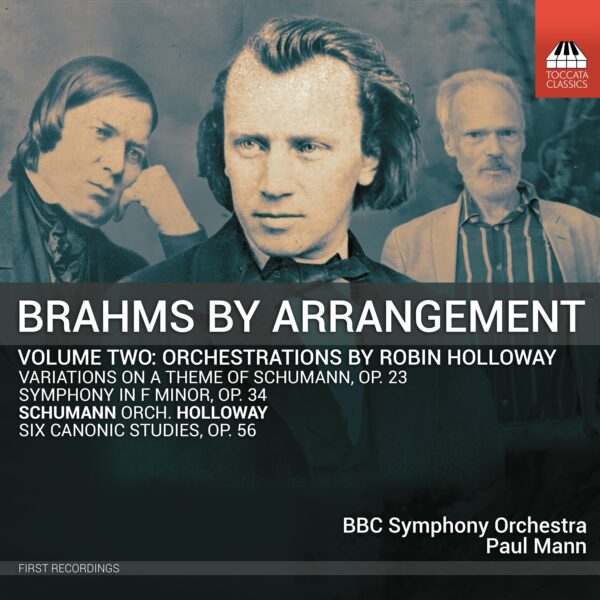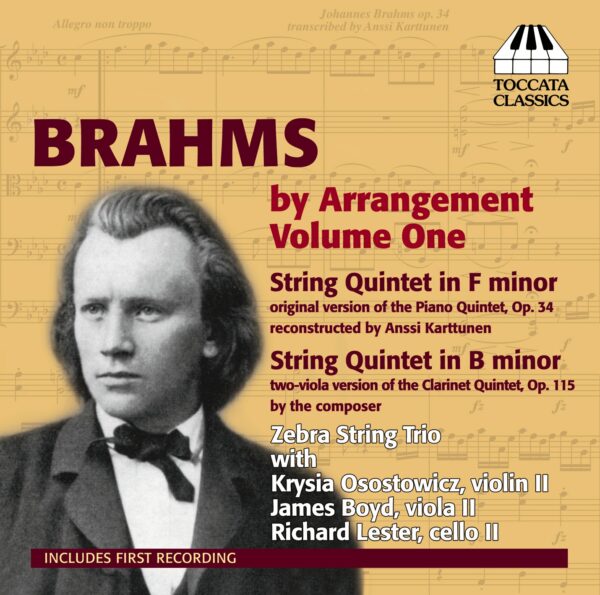Brahms by Arrangement, Volume Two: Orchestrations by Robin Holloway
Composers who orchestrate the music of earlier colleagues often serve them best when they add something of themselves to the work in hand. These three orchestrations by the English composer Robin Holloway (b. 1943) demonstrate his profound understanding of and affection for two of the most important Romantic composers – and his re-imagining of Brahms’ Sonata for Two Pianos (which Brahms himself recast as his Piano Quintet) as a symphony gives one of the greatest of all compositions a wild and thrilling energy, making it also a masterpiece of our own age.
BBC Symphony Orchestra
Cellerina Park, leader
Paul Mann, conductor
Listen To This Recording:
- Theme: Andante, Leise und innig
- Variation 1: Pochino più mosso, delicato
- Variation 2: Più mosso –
- Variation 3: A tempo, grazioso –
- Variation 4: Misterioso
- Variation 5: Grazioso con moto –
- Variation 6: Alla marcia
- Variation 7: Allegro leggiero
- Variation 8: Andante con moto ardente
- Variation 9: Maestoso –
- Variation 10: Alla marcia, poco lento
- Epilogue
- No. 1: Con moto egual’e dolce
- No. 2: Gently lilting, flowing
- No. 3: A tempo, andantino piacevole teneramente
- No. 4: Con moto amabile: supple and airy
- No. 5: Vivace
- No. 6: Andante serioso
- I Allegro non troppo
- II Andante
- III Scherzo: Allegro – Trio
- IV Finale. Poco sostenuto – Allegro commodo
BRAHMS
Variations on a Theme of Schumann, Op. 23, for piano duet (1861; orch. 2016)
SCHUMANN
Six Canonic Studies, Op. 56 (1845; arr. for two pianos by Debussy, 1891; orch. 2011)
BRAHMS
Symphony in F minor, Op. 34 (1864; orch. 2008) (after the Sonata for Two Pianos, Op. 34a)
FIRST RECORDINGS


MusicWeb International :
‘This is the main work here [Symphony in F minor after the Sonata for Two Pianos Op. 34a] and I want to say straightaway that, like the Schoenberg orchestration, it sounds marvellous. […] All the power and passion of the work come across.
Here he [Paul Mann] leads the BBC Symphony Orchestra, whose expertise with unfamiliar scores needs no stressing. The recording is good and the sleeve note, from which I have drawn, helpful. Brahmsians who are not averse to transcriptions should explore this.’
—Stephen Barber, MusicWeb International
Guardian :
‘The English composer pays reverent and inventive homage to music by the German grandee with the help of the BBC Symphony Orchestra conducted by Paul Mann. […]
Holloway treats [the Variations on a Theme of Schumann Op 23] with delicacy and tact, rendering them generally in pastel orchestral colours.
[…] he transforms the quintet into utterly convincing, minor-key symphonic Brahms, so that the disc’s description of the result as “Symphony in F minor Op 34” seems entirely justified.’
—Andrew Clements, Guardian
MusicWeb International :
‘Holloway’s orchestral scoring confirms the symphonic stature of the [quintet’s first] movement. The two inner movements – an Andante and a Scherzo – are imaginatively and idiomatically scored. In the Andante, the woodwind instruments and the strings are able to produce long, singing lines in a way that two pianos would not have been able to match in Op 34a. In the Scherzo, the involvement of timpani – though not to excess – helps to underline the driving rhythms. […]. The Poco sostenuto introduction to the finale has good tension thanks to the sustained orchestral lines. Brahms made the music in the main body of the movement, marked Allegro commodo (from 1:44), full of incident anyway, but Holloway’s imaginative and varied orchestration serves to underline that.
In summary, I think that Robin Holloway here sheds fresh, understanding light on Brahms’ music. I liked and admired what I heard and I also liked the sympathetic performance of the music by Paul Mann and the BBCSO. I think the dimensions of Brahms’ music and the enhancement which the orchestration provides fully vindicates Holloway’s decision to bestow the title ‘Symphony’ on what he has done. Whether other conductors and orchestras will take this piece up is an open question. In my view, it’s a strong piece which is at least as deserving of a place in the repertoire as Schoenberg’s orchestration of the Piano Quartet. […]
I very much enjoyed hearing Robin Holloway’s take on [Op.23] Variations. Again, his feeling for the Brahms idiom in terms of scoring is much in evidence – though not slavishly so. […] I found the overall result cohesive and convincing.
Brahms’ Op 23 is a fine piece and I very much admire the new light which Robin Holloway has so skilfully and sympathetically shone upon the music. […]
The Studies are quite brief – the longest plays here for 4:07 – but they are charming and in Holloway’s sympathetic scoring they are very pleasing to hear. […]
I’m full of admiration for the work that Robin Holloway has done on these three scores. It would be presumptuous to say he has shed new light onto the music; I don’t think that was ever his intention. Rather, I’d prefer to say that he has shed additional life onto these scores. His orchestrations seem to me to be consistently tasteful and idiomatic. Paul Mann and the BBCSO play the music very well indeed. Engineer Adaq Khan has recorded the performances with skill and sympathy.
This is a disc which is definitely worth hearing, especially by those who, like me, love the music of Johannes Brahms.’
—John Quinn, MusicWeb International
Colins Column :
‘Holloway’s scoring [of Op.34] is crystal-clear in absorbing the music’s themes and counterpoints into an orchestra piece, […] and is resourceful and ear-catching, making for diverse and illuminating listening. […]
Paul Mann and the BBCSO give a fine account […]. Toccata Classics TOCC 0450, which includes an essay by Holloway and is very well recorded […].
—Colin Anderson, Colins Column